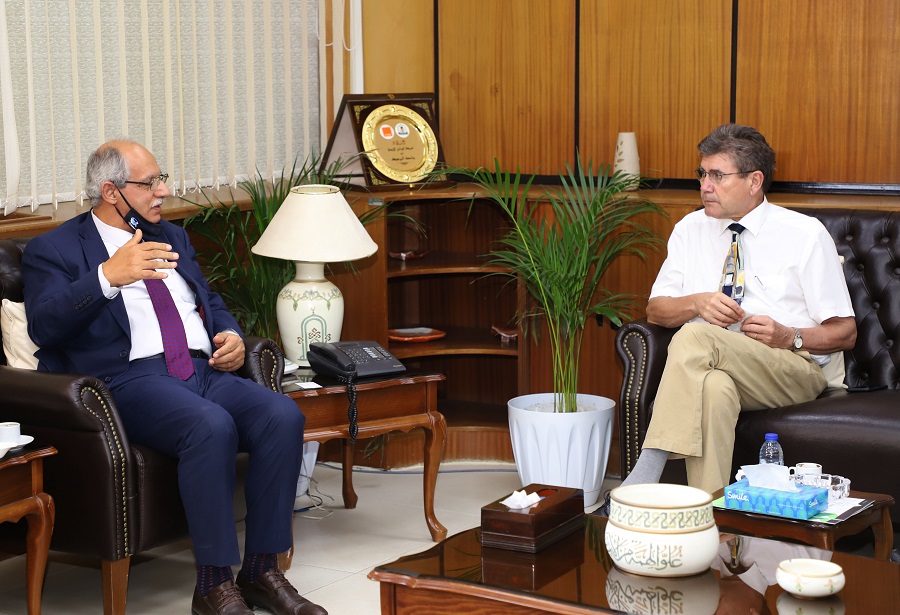The President of Yarmouk University, Prof. Nabil Hailat, met with a delegation from the German Embassy in Amman headed by Ambassador Bernhard Kampmann, discussing ways of enhancing scientific and research cooperation between Yarmouk and several German universities.
At the beginning of the meeting, Hailat welcomed the delegation, stressing the interest paid by Yarmouk to strengthening cooperation with various German higher education institutions. He pointed out the deep history of scientific, research and cultural cooperation between Yarmouk and various German universities, as evident in the nine cooperation agreements between the university and certain German universities as well as the three Erasmus-Plus agreements. He then explained that there are 52 Yarmouk faculty members who graduated from German universities and 19 students from Yarmouk who were sent to various German universities during one academic semester. Also, he mentioned that Yarmouk received 15 German students along with 16 faculty members who made scientific visits to the university while 10 faculty members were sent by Yarmouk in form of scientific visits to German universities.
Hailat further reviewed the rise of Yarmouk as one of the international universities that have several academic specializations offered by 15 faculties of scientific, social, human, and medical orientations. In addition, he pointed to the fact that Yarmouk has distinguished scientific centers, such as the Refugees, Displaced Persons and Migration Studies Center and the Language Center that attracts students from all over the world to join the program of Arabic for Non-Native Speakers. Moreover, he said that Yarmouk has a future aspiration to develop doctoral programs in the fields of political science and archeology.
Furthermore, Hailat called on the German embassy to serve as a bridge between Yarmouk and various German universities to enhance cooperation in the field of hosting faculty members specialized in teaching the German language, which is offered as a BA major by the German language program of the Department of Modern Languages at the Faculty of Arts. This calls for, as Hailat said, exchanging scientific visits between faculty members of German universities and Yarmouk, as such visits provide those members with the opportunity to learn about different cultures and novel experiences, in addition to providing students with the opportunity to complete their higher studies in Germany through the many scholarships offered by German educational institutions like DAAD. Finally, Hailat stressed Yarmouk’s readiness for the various types of academic and research cooperation, which positively reflects on the educational environment of the university.
In response, Mr. Kampmann stressed the German Embassy's endeavor to enhance the academic cooperation between Jordanian and German higher education institutions, praising the distinguished level of the educational system in the Hashemite Kingdom of Jordan. He added that such a heritage encourages various countries to enhance their scientific and cultural cooperation with Jordanian educational institutions, pointing out that Jordan is one of the countries that attract international students due to its successful educational system. He also highlighted the need to improve the links between science and industry to seize investment opportunities in the region, for example in the pharmaceutical and medical sectors.
He then said that it is important for all universities and educational institutes to offer specializations and develop study plans to meet the needs of the labor market and bridge the gap between the academia and the market needs. The industrial sector and companies, he explained, are looking for programs that create leaders who can change the way of thinking for the better, stressing the need to develop and update the various scientific and cultural field of study.
Kampmann also affirmed the embassy's readiness to cooperate with Yarmouk University by working on networking Yarmouk with various German universities and helping it to attract faculty members of the German language, in addition to providing short and long-term scholarships for students through the German Academic Exchange Service (DAAD). He added that such a cooperation includes exchanging scientific visits between Yarmouk University professors and German universities.
Interestingly, the meeting was attended by the Vice Presidents of the University, Prof. Mowaffaq Al-Amoush, Prof. Riyad Al-Momani, the Deans of the Faculties of Arts, Archeology and Anthropology, Dr. Muhammad Bani Doumi, Dr. Hani Hayajneh, the Head of the Department of Modern Languages, Dr. Batoul Muhaisin, and the directors of the Departments of International Relations and Projects and Public Relations and Media, Dr. Ghazi Maqableh, Mr. Mukhles Al-Abeni, the media and cultural officer at the embassy, Leonie Lorenz, and a number of officials from the embassy.
During their visit to the university, the delegation members visited the Jordanian Heritage Museum at the faculty of Archeology and Anthropology, where they listened to a detailed explanation of the exhibition's findings.


